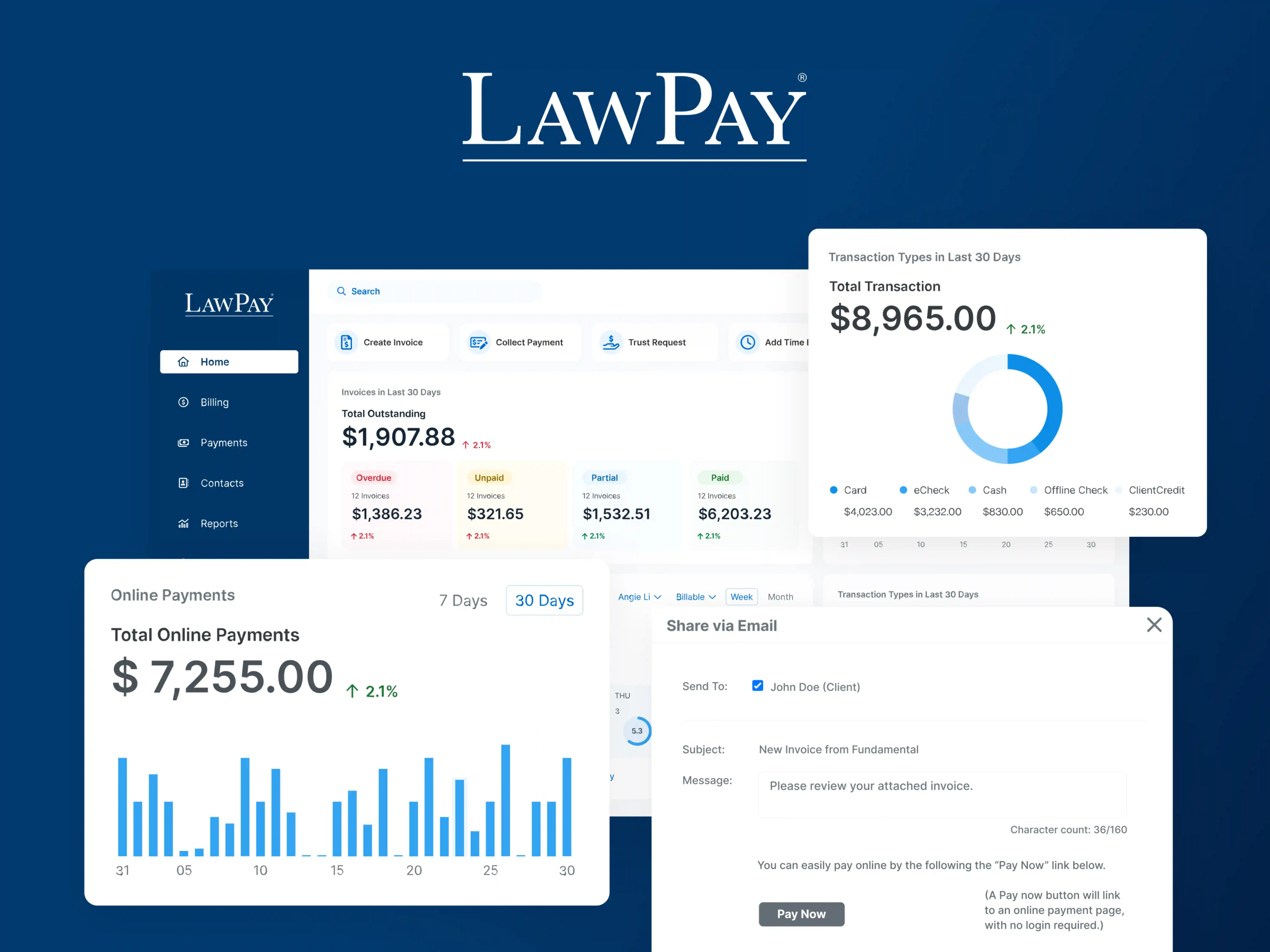Interviewing skills are critical to a lawyer's success for several reasons. A good screening interview with the client fosters candor, trust, and credibility. It also plays a role in identifying the most appropriate remedy for the issue presented.
Unfortunately, few lawyers are trained in the essential skill of screening clients. You can and should research sample intake questions online, but you'll need deeper information to sharpen your interviewing skills. That's why this guide includes all the essentials of the lawyer-client interview, including why the interview is so important, how to prepare, sample questions, and best practices.
Schedule a demo to see what LawPay can offer your firm.
Book Now
What Are Client Intake Interview Questions for Lawyers?
Intake interview questions are the queries lawyers ask in the screening interview with the client. Their main purpose is to determine whether the case and client match the firm's expertise, working style, and culture.
Why Is the Lawyer Client Interview Important?
The lawyer-client interview has two main components—fact-finding and establishing the attorney-client relationship.
Fact-Finding
Fact-finding allows you to assess the case and the client before you accept the business. You want to uncover any factor that inhibits your ability to manage the issue successfully. In this sense, success doesn't necessarily mean the firm realizes the exact outcome the client wants. But it does mean the client and lawyer aren't extremely disappointed with the result.
Success-inhibiting factors can be hidden in the details of the case, who's involved, and in the client's expectations.
Check for Conflicts of Interest
Since a conflict of interest will prevent you from taking a case, it's best to gather the names of everyone and other details involved right away. You don't want the prospective client to spend 30 minutes sharing personal information only to learn the issue involves your brother-in-law.
Understand Details of the Case
Once you've ruled out conflicts, the details of the case will be the focus of the screening conversation. You want to determine whether the issue suits your firm's expertise, what the possible outcomes are, and if those outcomes align with client expectations.
Evaluate Client Expectations
It's impossible to be successful if client expectations are unrealistic.
It's impossible to be successful if client expectations are unrealistic. At best, the client will be disappointed and look elsewhere for legal representation in the future. At worst, the client could file a complaint with your state bar association and post negative reviews online. Ensure that you and the prospective client are on the same page before moving forward.
Building a Relationship
Even as you are fact-finding, there is a sales component to the lawyer-client interview. If you determine that no conflicts exist and you believe you can resolve the issue to the client's satisfaction, you will want to win the business. To do that, you must make a good first impression, establish rapport, and set the right tone.
Making a Good First Impression
Ideally, the prospect quickly feels comfortable with your professionalism and expertise. Those feelings of comfort are born in the first impression you make. What you wear, how you speak, your tone and demeanor, all tell a story about who you are as a lawyer and what kind of service you'll provide.
Establishing Rapport
Follow up a good first impression with excellent communication skills to build rapport with the prospect. Listen, demonstrate an understanding of the issues, and show respect for the client's perspective.
Setting the Tone
While you are making a positive impression, you must also firmly establish what your expectations are. For example, you expect that the client will return phone calls and that invoices will be paid within stated terms. It's best to clarify these things early so there are fewer misunderstandings down the road.
How to Prep for the Client Interview
Given the number of objectives to fulfill in the client interview, it's smart to allocate time to prepare. Preparation should involve setting goals, documenting the client interview questions you'll ask, reacquainting yourself with the client traits you prefer, and stepping into problem-solving mode.
1. Set Goals
A primary goal should be to determine whether the client is a good fit for your firm. As mentioned above, there are nuances here. Conflicts, the details of the case, and the client's personality and goals can all play a role.
2. Document the Questions to Ask
Craft questions that can help you fulfill your stated goals. You'll find some lawyer-client interview question samples listed below.
3. Know Your Ideal Client
If your firm doesn't have client personas defined, spend time thinking about who your ideal client is. You may ask: Which issues do you prefer to take on? What personalities work best with yours? What are your financial requirements?
You can also take the opposite approach—try making a list of "dealbreaker" client traits that would prompt you to decline the work.
4. Step into Problem-Solving Mode
When prospective clients come into your office, they have a problem to solve—possibly a serious one involving personal failure or unexpected tragedy. Whatever the nature of the issue, it is a source of frustration for the client.
Given that frustration, prospects may display a range of emotions in your office. Anger, desperation, and hope are common.
Don't let the emotion sway you from defining the problem and considering potential solutions. Every legal matter, at its core, is a problem to be solved.
Lawyer Client Interview Question Samples
Below are seven essential client interview questions to ask in a legal interview.
1. What Brings You In?
Starting with an open-ended question gives prospects the chance to tell the story the way they see it. The client’s answers can be telling in terms of motivations, needs, and expectations.
2. Can You Describe the Case?
After the client's initial summary, direct the conversation to the details of the case, including who is involved. Ask follow-up questions as needed to get a complete picture of the problem at hand.
3. Have You Talked to Other Attorneys About This Issue?
You likely don't want the client who's retained and fired three attorneys on the same issue. You may also need to reset expectations for someone who has only consulted their sister, the law student.
4. How Would You Like to See the Issue Resolved?
As noted, understanding the client's expectations is an essential piece of determining whether you can handle the issue effectively.
5. Are You Open to Other Outcomes?
This question helps you evaluate how rigid the client will be. A rigid client will be hard to please.
6. Shall We Talk About Your Budget?
Legal representation is expensive. You must evaluate a prospect's ability to compensate the firm as required.
LawPay has other features to help you manage payments including secure card storage.
If you use a robust legal payment software like LawPay, you can discuss the non-traditional payment options your firm supports, such as installments and legal fee financing. LawPay has other features to help you manage payments, too, including echeck support, scheduled payments, and secure card storage.
7. What Do You Know About the Attorney-Client Process?
The answer to this question tells you how much time to spend explaining procedural aspects of your relationship with this client. A client who's never worked with a lawyer needs a thorough description of the next steps, including intake, billing, collaboration, and communication.
Best Practices for Client Interviews
Careful preparation encourages a successful outcome for your client interviews. As well, there are three best practices to keep in mind as you manage the conversation. You’ll want to form a bond of trust early, encourage questions, and watch for red flags.
Form a Bond of Trust Early
Schedule a demo to see what LawPay can offer your firm.
Book Now
Often, you earn trust through the small client-centered actions you take and don't take. Dress professionally and give the prospective client 100% of your attention. That means you aren't checking emails or answering the phone. Rather, you are listening, asking probing questions, and taking notes.
Encourage Questions
Encouraging prospects to ask questions builds rapport. It also helps you understand their needs and motivations.
Review Scenarios
Many legal issues have a quick solution and a lengthier one. When applicable, review both scenarios with the prospect and gauge the reaction. A client who will only settle for a specific number, no matter how long it takes, may not be a collaborative partner.
Watch for Red Flags
Red flags are the circumstances that potentially make it impossible for you to resolve the client's issue satisfactorily. Here are three examples:
The client admits to parting ways with another lawyer (or several other lawyers) on the same issue.
The client is motivated by anger and seeks revenge.
The law simply doesn't support the client's position or expectations.
Manage Your Law Firm's Client Interviews
Best practices include establishing trust, encouraging questions, reviewing scenarios, and watching for red flags.
A thorough client interview contributes to successful outcomes and happy clients. A rushed or incomplete interview does the opposite. Set yourself and your firm up for success by preparing and following best practices for your screening meetings. Preparation involves setting goals, jotting down questions to ask in a legal interview, revisiting the type of client you want, and getting focused on solving problems. Best practices include establishing trust, encouraging questions, reviewing scenarios, and watching for red flags.
Technology can help you manage these moving parts. Case management software MyCase includes a client intake module with several time-saving features. For example, you can set up templated intake forms and questionnaires for each of the issue types you commonly handle. Once the client is ready to sign, you can send the paperwork digitally and request e-signatures. The documentation automatically ports into the client's case file, which minimizes data entry.
Combine LawPay and MyCase for unparalleled efficiency at the start of and throughout your client relationships. For simple and secure billing and payments, schedule a LawPay demo today. For productive client intake and case management, sign up for a free MyCase trial.
About the author

Catherine BrockContent Writer
Catherine Brock is a Content Writer for leading legal software companies, including MyCase, Docketwise, CPACharge, CASEpeer, and LawPay—the #1 legal payment processor. She covers emerging legal technology, financial wellness for law firms, the latest industry trends, and more.
